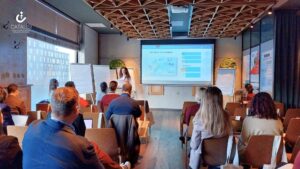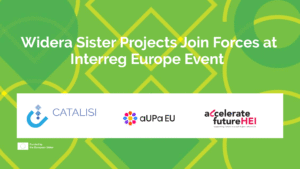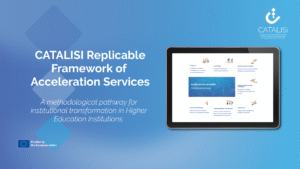
Reframing the Role of Universities Through Participation and Openness
According to the UNESCO Recommendation on Open Science, “collaboration, participation, and inclusion” are part of the foundational principles of Open Science, the open approach to conducting, disseminating, and evaluating scientific research. A University that makes Open Research one of its core values must, in fact, experiment with participatory practices within its institutional processes. The Mobilization and Mutual Learning (MML) Event, organized in synergy with APRE and hosted by Luiss on October 17, 2024, witnessed this openness to experimentation and innovation of processes. With the idea of collaboration, members of the academic community, facilitators, and external stakeholders gathered with a common goal: raising awareness about the Third Mission and investigating related activities by exchanging of knowledge, skills, and best practices.
CATALISI operates, with the support of process facilitators, within Higher Education Institutions (HEIs) with the goal of their institutional transformation: specifically, the acceleration to be pursued over these three years in the fields of Research and Innovation will span multiple universities, strengthening collaboration and alliance between EU institutions. Aware of the importance of this synergistic journey, Luiss, as a partner of CATALISI, has chosen three thematic areas to focus on: supporting talent mobility, promoting Open Science and the digitalization of research, public impact, and attention to social challenges. Within the third thematic focus, Luiss dedicated the MML Event in October to the Third Mission—with a particular emphasis on research valorization and societal engagement—and chose to concentrate on identifying shared criteria to measure the effectiveness and impact of Third Mission activities in a European academic context.
Highlights of the Luiss MML Event
The event’s structure was designed to serve both as a moment of institutional reflection and international exchange. Its twofold objective was, on the one hand, to open a space for dialogue with European peers academies in order to position Luiss as a proactive agent of change; on the other hand, to strengthen internal coordination and mutual understanding among departments. The focus remained firmly on activities at the intersection of research and public engagement.
After an initial plenary session and institutional greetings, participants engaged in a series of collaborative workshops. The first was the “Alphabet Icebreaker,” in which three groups were tasked with associating a term linked to the Third Mission to each letter of the alphabet—creating, in effect, a shared lexicon to guide the day’s discussions. This activity set the tone for deeper engagement, establishing a common language around complex concept.
Next, an “Incremental Knowledge” session invited participants to analyze three central domains—Communication of Research, Commissioned Engaged Research, and Public Engagement Projects and Events—by reflecting on the impact they generate, how that impact can be measured, and the challenges inherent in doing so. Each group built upon the insights of the previous one in a cumulative process, creating a dynamic and coherent knowledge base. These participatory dynamics culminated in a final plenary feedback moment, where key findings were shared and contextualized.
Throughout the day, the active involvement of Luiss structures—such as the Research & Third Mission Office, the Library, the ESG Office, and the Lectures & Seminars Office—helped show how deeply the Third Mission is embedded in the university’s identity. This institutional commitment is not only strategic but also operational: from supporting Open Science to incentivizing outreach, and from coordinating research dissemination via social media to curating the Research & Third Mission Newsbook, Luiss has consolidated an integrated and outward-looking approach to research impact.
From Workshop to Strategic Action
Beyond knowledge sharing, the MML event also served as a springboard for institutional development. Insights gathered during the day will inform the creation of a new impact assessment framework at Luiss, incorporating key performance indicators to better track and evaluate Third Mission outcomes. Moreover, the event’s success has sparked interest in replicating the MML methodology in future contexts, extending its use beyond the CATALISI project to address other strategic priorities within the university.
Ultimately, the Luiss MML Event demonstrated how open, collaborative formats can play a critical role in rethinking the role of universities in society. By fostering shared language, shared challenges, and shared solutions, Luiss reinforced its vision of a university that listens, learns, and leads in shaping the future of responsible research and innovation.
“This event was a meaningful opportunity to showcase how deeply the Third Mission is embedded in the identity of Luiss; today, the social impact of research stands as a testament to the strength and maturity of this institutional sensitivity.”



